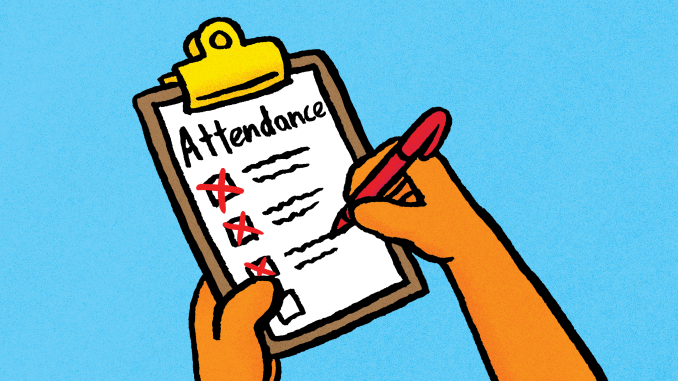
As the Fall 2021 semester comes to a close, Temple University professors will calculate students’ attendance grades using the university’s pre-pandemic policies, which allow them to set their own rules for what counts as an excused absence and how many unexcused absences students get before they’re penalized, said Daniel Berman, vice provost for undergraduate studies.
“Every instructor should have the ability to set expectations for participation and attendance that are based on the requirements, the expectations of their own course,” Berman said. “And that’s where the deciding takes place, not at some more central level, where we would be basically imposing a system on a whole variety of different sorts of courses.”
For example, Susan Bertolino, a non-tenured track professor in the intellectual heritage department, will penalize students after missing four classes. The course meets every Tuesday and Thursday so students have two weeks before attendance will impact their grade, she said.
Attendance policies should be stated in a professor’s syllabus, Berman added.
Benjamin Altschuler, assistant professor at the school of Sport Tourism and Hospitality Management, allows students to have three unexcused absences in his Business of Leisure course before being penalized, he said.
However, in Altschuler’s Cultural Intelligence class, a five-week online graduate course that meets once per week, students can only miss one class before their grade is negatively affected because there’s only a handful of class sessions, he said.
Temple’s return to pre-pandemic attendance policies came after the university implemented looser guidelines for the 2020-21 academic year, when students were excused from class without penalty if they felt ill or were exposed to COVID-19, even if they did not provide formal documentation from a health care provider.
Last year’s policy relied on students being truthful about the reason for their absence, according to the university’s protocol.
Bertolino believes her students were truthful and did not take advantage of the increased leniency of last year’s policy.
“I think if they’re not coming, they’re not thinking, ‘Well, I’ll use the COVID thing as an excuse,’” Bertolino said. “I really, and maybe I’m naive, but I really don’t think that’s what it is.”
Temple gave professors flexibility to set their own rules regarding attendance policies because courses vary in how much participation matters. Classes like seminars or labs may rely heavily on participation, while attendance may not have as great of an impact on classes like big lectures, especially if students can access course materials like PowerPoint presentations online, Berman said.
Altschuler appreciates that there isn’t a university-wide attendance policy, he said.
“I think each professor has their preferences for what it means to be in class,” Altschuler said. “I think every class presents certain sorts of situations. I think every professor has a tolerance level for what they think is, you know, an acceptable amount of excuses versus unacceptable excuses,” he added.
Semaja Murphy, a freshman theater education major, has noticed some of her professors don’t mind if students miss classes, as long as it doesn’t become a habit, she added. She believes professors should consider their students’ opinions when crafting attendance policies.
“I think that the professor should ask the class and honestly, I think it should be like a survey, like how do you feel?” Murphy said.
Students and instructors may request the counsel of an advisor or the Office of the Dean in special cases, according to Temple’s attendance policy. This includes cases like if the student feels like they are being penalized unfairly or if students have questions about their instructor’s policy, Berman wrote in an email to The Temple News.
Devyn Keane, a senior media studies and production major, doesn’t believe attendance for General Education Program classes and Zoom classes should affect a student’s grade.
“I think that really takes a toll on people, especially people who get really sick with flu or even COVID,” Keane said. “If a teacher does decide to grade attendance, it should be no more than like 10 points.”
Kate Goldinger, a senior public relations major, thinks the university shouldn’t have changed its attendance policies this year because the pandemic is still prevalent. There should still be the option to miss class if necessary without being penalized, she added.
“I know it’s tricky, we’re all learning how to navigate what is happening because no one here has dealt with something like this before, so I think while it’s still affecting our world, we are wearing masks like there should be conversation still,” Goldinger said. “There shouldn’t be just set in stone policies that people are uncomfortable with because overall everyone wants to feel safe.”
There are 36 active cases at Temple as of Nov. 26, according to the university’s vaccine and case dashboard.
“I at least want to be the force that I consider the force of good you know, that has some compassion, because I don’t feel our society or just other institutions have been particularly compassionate or even recognizing how destabilizing this whole COVID lockdown has been,” Bertolino said.


Be the first to comment